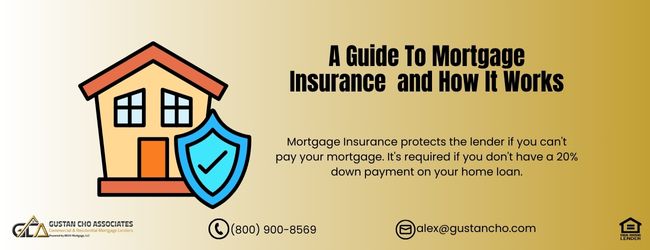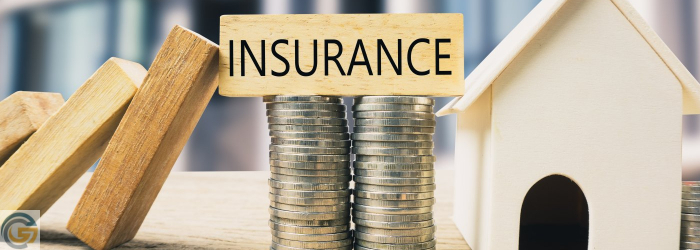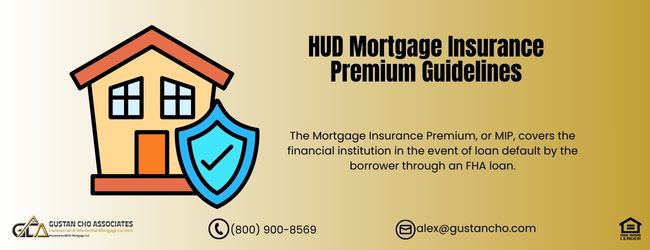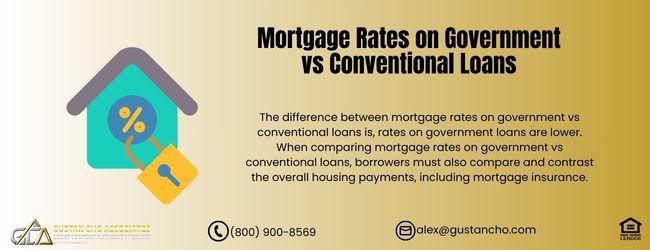A Guide To Mortgage Insurance and How It Works

This guide covers the mortgage insurance and how mortgage insurance works. We will discuss the private mortgage insurance on conventional loans and mortgage insurance premium on government loans. We will cover how MIP and PMI works on conforming and government-backed loans. Private mortgage insurance is required on all conventional loans for borrowers with less than 20% equity. Mortgage insurance depend on the type of home loan, the borrowers credit scores, the loan-to-value, the loan amount, the borrower’s debt-to-income ratio, and other credit and income factors.
Private mortgage insurance applies to conventional loans. Mortgage insurance premium applies to government-backed loans, primarily FHA home loans.
Mortgage insurance protects lenders if a borrower defaults on their mortgage payments. Private mortgage insurance plays a critical role in the mortgage industry. Especially for borrowers who cannot afford a down payment of 20% of the home’s purchase price. Without PMI, lenders would be more hesitant to approve mortgages for these borrowers. The potential for homeownership would be significantly reduced. Consequently, PMI allows borrowers to access mortgage loans with down payments as low as 3% (first-time homebuyers) or 5% for seasoned homebuyers. In the following paragraphs, we will cover how private mortgage insurance works on conforming loans and private mortgage insurance premium on government loans.
What Is Mortgage Insurance
PMI is an unavoidable expense for many borrowers but can be manageable. The cost of PMI varies based on the loan amount, loan-to-value ratio, and credit score. Private mortgage insurance varies in cost. However, the mortgage insurance premium on government-backed mortgages is a fixed factor. Typically, private mortgage insurance, or PMI, ranges from 0.3% to 1.5% of the original yearly mortgage loan amount. Chad Burns, a dually licensed realtor and loan officer at GCA FORUMS explains mortgage insurance as follows:
It is important to note that PMI is not the same as homeowner’s insurance. Homeowner’s insurance protects the homeowner in case of damage to the property, while PMI protects the lender in case the mortgage loan default.
Different types of loan products require mortgage insurance. For example, FHA loans, backed by the Federal Housing Administration, require two different type of mortgage insurance premium (MIP). A one-time upfront mortgage insurance premium and an annual mortgage insurance premum for the life of the loan. Conversely, conventional loans require private mortgage insurance until the subject property reaches 20% equity or 80% loan-to-value. Speak With Our Loan Officer for Mortgage Loans
Borrowers Have the Option to Pay Upfront Mortgage Insurance
Borrowers also have the option to pay for private mortgage insurance upfront or through their monthly mortgage payments. Paying upfront can be a more cost-effective option in the long run but requires a higher upfront cost. You have the option of paying an upfront mortgage insurance on conventional loans and eliminate the annual private mortgage insurance. Aside from PMI, borrowers can consider other loan products when purchasing a home. Fixed-rate home mortgages have a fixed interest rate for the entire loan term, which can provide stability for borrowers. On the other hand, adjustable-rate mortgages have an interest rate that can change periodically based on market conditions.
Mortgage Insurance Premium on Government-Backed Loans
Borrowers can also consider government-backed loans, such as VA loans for veterans or USDA loans for borrowers in rural areas. These loans often have lower down payment requirements and more lenient credit score requirements. Aspiring homeowners often face the challenge of obtaining a significant down payment to secure their dream home. However, with Private Mortgage Insurance (PMI), the path to homeownership has been made easier. PMI is like insurance that protects lenders from potential losses when borrowers default on their mortgage loans. In this article, we will delve into a deeper understanding of the role of PMI and how it interacts with different loan products.
Borrower-Paid versus Lender-Paid Mortgage Insurance
There are different types of PMI, but the most common is borrower-paid PMI. This means that the Borrower pays a monthly premium to the lender, which is added to their mortgage payment. The premium is based on a percentage of the loan amount and can vary depending on factors such as the Borrower’s credit score and the down payment size.
Private mortgage insurance is an insurance policy that safeguards the lender in case of borrower default. PMI is typically required for conventional loans, which are not backed by the government.
Again, PMI can be either borrower-paid or lender-paid. In borrower-paid PMI, the Borrower pays a monthly premium, which is included in the monthly mortgage payment. On the other hand, in lender-paid PMI, the lender pays the insurance premium, and the Borrower may have to pay a slightly higher interest rate.
PMI is Not the Same as MI
It’s important to note that PMI is not the same as Mortgage Insurance (MI). MI is insurance that protects lenders against losses if a borrower defaults on a mortgage loan backed by the government, such as FHA or VA loans. MI is required for all FHA and VA loans and can only be terminated when the Borrower has paid off the loan. Determining which option is best depends on various factors, such as the Borrower’s credit score, interest rates, and loan duration. Different loan products interact differently with PMI. For example, conventional loans require PMI if the Borrower’s down payment is less than 20%. However, some conventional loans may not require PMI if the Borrower has a credit score of 760 or higher. Other loan products, such as FHA loans, require MI regardless of the down payment.
Click Here to Apply for Mortgage Loans Today
PMI Allows the Borrower To Put Lower Down Payment
PMI is critical in the mortgage industry, allowing borrowers to access mortgage loans with lower down payments. Dale Elenteny of Gustan Cho Associates explains what private mortgage insurance is and how PMI works:
Private Mortgage Insurance, commonly known as PMI, plays a critical role in the home-buying process for many Americans. It is a type of insurance typically required by lenders when borrowers do not have a 20% down payment.
Understanding PMI and its interaction with different loan products is crucial for borrowers who want to make informed decisions when purchasing a home. Therefore, consulting with lenders and mortgage professionals is essential to determine how PMI best suits your needs and financial situation.
Private Mortgage Insurance is an Insurance Policy For The Lender
Private mortgage insurance is an insurance policy that insulates the lender in case of borrower default. PMI is typically required for conventional loans, which are not backed by the government. The borrower is responsible for paying the premium, which can be paid monthly, annually, or upfront as a lump sum. The borrower is responsible for paying the premium, which can be paid monthly, annually, or upfront as a lump sum. Many different loan products are available to homebuyers, each with unique requirements and benefits. The most common types of loans are conventional, FHA, and VA.
Private Mortgage Insurance on Conventional Loans
Conventional loans are the most common type of home loan and are not backed by the government. These loans commonly require a down payment of at least 3% and can have fixed or adjustable interest rates. PMI is required for conventional loans with less than a 20% down payment.
Mortgage Insurance Premium on FHA Loans
FHA loans are insured by the Federal Housing Administration and are used to help low-to-moderate-income borrowers. These loans require a down payment of at least 3.5% and have fixed interest rates. Mortgage Insurance Premium is required for FHA loans and is paid monthly. FHA loans are supported by the Federal Housing Administration and require an upfront mortgage insurance premium (MIP) and an annual MIP. The upfront MIP is usually 1.75% of the loan amount, and the annual MIP is based on the loan term, loan amount, and loan-to-value ratio. PMI is not the only option for borrowers who cannot make a 20% down payment. Some lenders offer products such as piggyback loans or FHA loans. Piggyback loans involve taking out two loans – one for the down payment and one for the remaining balance.
VA Funding Fee on VA Loans
VA loans are guaranteed by the Department of Veterans Affairs and are designed to help eligible veterans, active-duty service members, and surviving spouses buy homes. These home loans have fixed interest rates and do not require a down payment. VA loans do not require PMI. VA loans are available to eligible veterans and require a funding fee instead of PMI. The funding fee is a one-time fee that can be financed into the loan amount.
Mortgage Insurance Premium on USDA Loans
The United States Department of Agriculture (USDA) offers a loan program that allows borrowers to purchase homes in rural areas with no down payment. However, USDA loans also require borrowers to pay PMI. Unlike other loan programs, the PMI for USDA loans is split into two parts: an upfront fee paid at closing and an annual fee paid over the life of the loan. The upfront fee for USDA loans is 1% of the loan amount, while the annual fee is 0.35%. While the cost of PMI for USDA loans can add up over time, it is often more affordable than the PMI required for other loan programs. Additionally, USDA loans offer competitive interest rates and flexible credit requirements, making them a popular choice for homebuyers in rural areas.
Is there PMI on a Non-QM Loan?
Non-QM loans are designed for borrowers who may not meet the strict underwriting requirements of traditional mortgages. These loans are often used by self-employed individuals, those with irregular income, or borrowers with less-than-perfect credit. Because these loans are considered riskier than traditional mortgages, lenders may require borrowers to pay PMI even if they put down more than 20% of the home’s purchase price.
Some non-QM loans do not require PMI. For example, some lenders offer non-QM loans structured as a piggyback loan, where the borrower takes out a second loan to cover the down payment.
In this scenario, the borrower is technically putting down 20% or more of the purchase price, which means that PMI is not required. A jumbo loan is another non-QM loan that may not require PMI. Jumbo loans are typically used to finance homes that exceed the conforming loan limits set by the Federal Housing Finance Agency. Because these loans are considered high-risk, they often come with higher interest rates and stricter underwriting requirements. However, some lenders may offer jumbo loans without requiring PMI, particularly if the borrower has a high credit score or a large down payment.
Why Non-QM Loans Do Not Require Private Mortgage Insurance
Ultimately, whether or not PMI is required on a non-QM loan will depend on the lender and the specific terms of the loan. Borrowers considering a Non-QM loan should speak with their lender to determine if PMI will be required and explore alternative loan structures if they prefer to avoid PMI. While PMI is typically required on mortgages where the borrower puts down less than 20% of the purchase price, the rules surrounding PMI on non-QM loans are a bit more complex. Some non-QM loans may require PMI, while others may not. Borrowers considering a non-QM loan should work closely with their lender to determine if PMI will be required and explore alternative loan structures if they prefer to avoid PMI.
Click here to discuss about your Mortgage Enquiry with Us
More on Mortgage Insurance Guidelines For Homebuyers and Homeowners
Overall, private mortgage insurance is an important consideration when purchasing a home. Understanding the loan products available can help borrowers make informed decisions about their home financing options. By working with a knowledgeable lender, homebuyers can navigate the complex world of mortgage insurance and find the best loan product for their needs. PMI is critical in the mortgage industry, allowing borrowers to access mortgage loans with lower down payments. Understanding PMI and its interaction with different loan products is crucial for borrowers who want to make informed decisions when purchasing a home. Therefore, consulting with lenders and mortgage professionals is essential to determine how PMI best suits your needs and financial situation.
Cost of Mortgage Insurance
It is important for borrowers to understand the costs and benefits of each option and, again, to work with a lender who can help them choose the best product for their situation. FHA loans are backed by the Federal Housing Administration and require a lower down payment than conventional loans, but they also come with their own set of requirements and costs. While PMI can add to the cost of a mortgage, it can also make it possible for more people to achieve the dream of homeownership.
How To Get The Lowest Mortgage Insurance on Your Home Loan
If you should decide to buy, before you begin looking for a home and during the process, we have vast experience working with buyers to get them ready to purchase their dream home. We can take you through the entire financing process for your home loan. Gustan Cho can help you network with realtors and other third-party professionals during home buying.
We also can connect you to title companies, real estate attorneys and real estate agents in your area that can help as needed. GCA FORUMS has a national reputation for being able to do mortgage loans other lenders cannot do.
Call or text Gustan Cho at 262-627-1965 or email at gcho@gustancho.com for more information and further assistance. Gustan Cho is the branch manager and National Managing Director at Gustan Cho Associates and is licensed in 48 states, including Washington, DC, Puerto Rico, and the U.S. Virgin Islands. Gustan Cho has successfully guided many homeowners through obtaining a home on both the lending and real estate side. She does not represent buyers or sellers but offers free consultation in 48 states at Gustan Cho by connecting homeowners, buyers, and sellers to the needed sources.
FAQs: A Guide To Mortgage Insurance and How It Works
- 1. What is Mortgage Insurance, and why do I need it? Mortgage Insurance protects the lender if you can’t pay your mortgage. It’s required if you don’t have a 20% down payment on your home loan.
- 2. What’s the difference between Private Mortgage Insurance (PMI) and Mortgage Insurance Premium (MIP)? PMI is for conventional loans, while MIP is for government-backed loans like FHA. Both help you get a loan with a smaller down payment.
- 3. How does Private Mortgage Insurance (PMI) work? You’ll have to pay PMI on your mortgage if you put down less than 20% on a conventional loan. This insurance is put in place to protect the lender in case you cannot repay the loan.
- 4. When can I stop paying Mortgage Insurance on my loan? For PMI on conventional loans, you can stop paying once you reach 20% equity in your home. MIP on FHA loans often lasts the life of the loan unless you refinance.
- 5. Can I pay Mortgage Insurance upfront instead of monthly? Yes, you can pay Mortgage Insurance upfront, which might save you money over time, but it requires a larger payment at the start.
- 6. Does my credit score affect the cost of Mortgage Insurance? A higher credit score can lower your PMI cost on conventional loans, but MIP on FHA loans is usually a fixed rate.
- 7. Is Mortgage Insurance required for all types of loans? If you have less than 20% to put down, you need mortgage insurance for conventional loans. Government loans like FHA always require it.
- 8. Can I avoid paying Mortgage Insurance? You can avoid PMI on a conventional loan if you put down at least 20%. For FHA loans, MIP is unavoidable, but other loan options might help.
- 9. What happens if I miss a Mortgage Insurance payment? Since Mortgage Insurance is usually included in your monthly mortgage payment, you need a payment to avoid defaulting on your mortgage.
- 10. Is Mortgage Insurance the same as homeowner’s insurance? No, Mortgage Insurance protects the lender if you default, while homeowner’s insurance covers damage to your property.







Responses